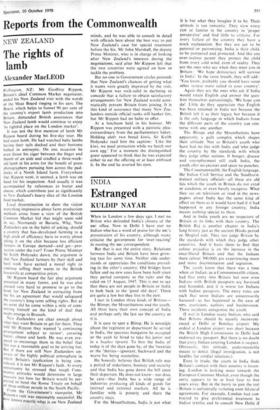Reports from the Commonwealth
NEW ZEALAND
The rights of lamb
Alexander llaeLEOD
Wellington, NZ: Mr Geoffrey Rippon, Britain's chief Common Market negotiator, ended his New Zealand visit with the words of the Meat Board ringing in his ears. The Board, which helps to funnel 90 per cent of the country's export lamb production into Britain, demanded British assurances that New Zealand lamb would continue to enjoy 'its rightful place on the London market'.
It was not the first mention of lamb Mr Rippon heard during his five-day tour. He had eaten Iamb. He had watched baby lambs having their tails docked and their bottoms bathed in antiseptic. On one occasion he even thrust his cigar between the finger and thumb of an aide and cradled a three-week- old lamb in his arms for the benefit of press photographers pursuing him across the pad- docks of a North Island farm. Everywhere that Rippon went, it seemed, a lamb was on hand for his inspection. And usually it was accompanied by references to butter and cheese, which contribute just as significantly to New Zealand's heavy slice of the London food market.
Local determination to show the visitor everything impressive about farm production methods arose from a view of the British Common Market bid that might seem odd in. say, Normandy or Bavaria. Why, New Zealanders are in the habit of asking, should a country that has–developed farming to a high pitch of efficiency have to worry about taking it on the chin because less efficient farmers in Europe demand—and get—pro- tection under the CAP? From Prime Minister Sir Keith Holyoake down, the argument is that New Zealand farmers by their skill and hard work have earned a moral right to continue selling their wares to the British housewife at competitive prices.
Mr Rippon heard the fair play argument presented in many forms, and he was also pressed very hard to promise to go to the brink for New Zealand in extracting from the Six an agreement that would safeguard the country's long-term selling rights. But at no point did he come within a mile of com- mitting himself on the kind of deal that might emerge in Brussels.
New Zealanders are clear enough about What they want Britain to get for them. They told Mr Rippon they wanted 'a continuing arrangement subject to review', covering butter cheese and lamb. He was even pre- pared to encourage them in the belief that this was a reasonable goal to be striving for. But if there are still New Zealanders un- aware of the highly political atmosphere in Which Britain's application is being con- sidered, it is not Mr Rippon's fault. At every opportunity he stressed that tough Com- munity attitudes would determine in large measure just how far Britain would be per- mitted to bend the Rome Treaty on behalf of three million people in the South Pacific. From the Government's viewpoint, Mr IPP° s visit was reasonably successful. He aw knows exactly what is on New Zealand minds, and he was able to consult in detail with officials here about the best way to put New Zealand's case for special treatment before the Six. Mr John Marshall, the deputy Prime Minister, who is in charge of looking after New Zealand's interests during the negotiations, said after Mr Rippon left that the two countries were agreed on how to tackle the problem.
But no-one in Government circles pretends that New Zealand's chances of getting what it wants were greatly improved by the visit. Mr Rippon was rock-solid in declining to concede that a failure to obtain satisfactory arrangements for New Zealand would auto- matically prevent Britain from joining. It is this kind of assurance that many New Zea- landers outside official ranks still hanker for, but Mr Rippon had no balm to offer.
At a luncheon held in his honour, Mr Rippon was presented with a patriotic plea- extraordinary from the parliamentary baker. Holding aloft two bread kiwis, Sir Keith Holyoake read him the caption: 'Like the kiwi, we need protection while we hatch our own egg.' For a moment the distinguished guest appeared to think that he was expected either to eat the offering or at least embrace it. In the end he averted his eyes.






































 Previous page
Previous page